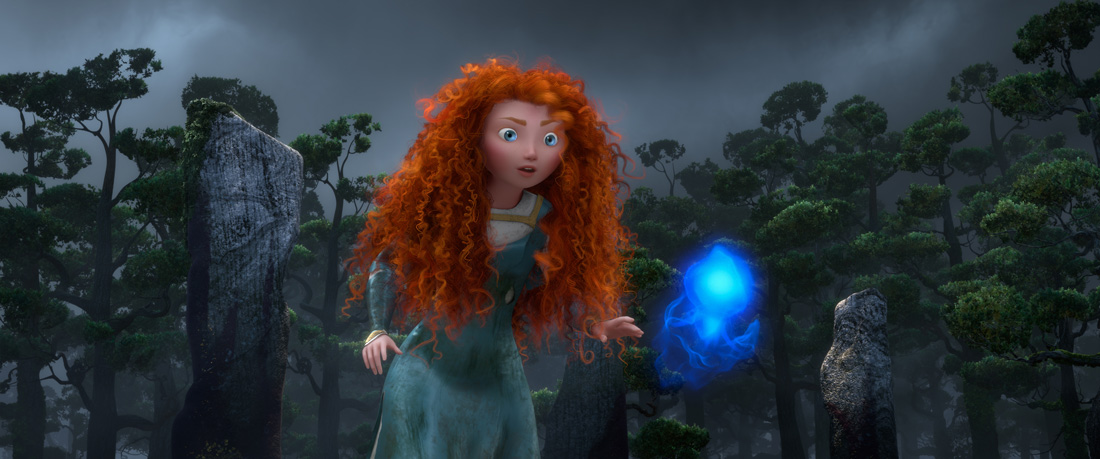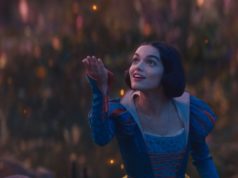Well, everything comes to an end. Brave is Pixar’s 13th animated feature film in 17 years, and it marks the first time I walked out of a Pixar movie feeling disappointed. Many people felt that way about last year’s Cars 2. I didn’t because I wasn’t expecting that much from it. Brave is more ambitious. It’s trying to do something besides entertain us. That only makes its mediocrity into a more pronounced end to the studio’s winning streak.
As you may have heard, this is the first Pixar movie with a female main character. She is Merida (voiced by Kelly Macdonald), the tomboyish daughter of a king and queen in medieval Scotland. While her father (voiced by Billy Connolly) indulges her, her mother (voiced by Emma Thompson) frequently clashes with Merida, trying to force her to behave like a proper lady. After a definitive break between Merida and her mother, the princess runs away from home and into the path of a dotty witch (voiced by Julie Walters), who grants her a magic spell that will “change her fate.” Oh, Merida, did your mum never tell you not to take witches at their word or at least to pin them down on specifics? Anyway, the spell is a curse that threatens to destroy Merida’s family and plunge the country into civil war.
One thing hasn’t changed: This Pixar movie looks good. I spent a large chunk of the film staring at Merida’s permanently tousled red hair and marveling that it was made entirely out of pixels. Scarcely less watchable is the Scottish landscape, rendered in luxurious blues and dark greens.
However, after the witch’s curse takes effect, the proceedings make a weird left turn into farce, as Merida has to hide her mother from the rest of the court. The attempts at playing the situation for humor fall flat, and while the story is supposed to be about mother and daughter gaining a better understanding of each other, the circumstances make that pretty much impossible. The witch leaves Merida instructions for undoing the curse, but the girl misreads it in a painfully obvious way. The curse also hits Merida’s three young brothers with some cute results, but that happens because she leaves a pie out when her brothers are well-known pastry thieves. Characters being less intelligent than the audience and plot developments that can be seen coming yards away –– this isn’t the Pixar I’ve come to know.
The bigger problem is Merida herself, I hate to say. She’s basically a petulant teenager, and while she doesn’t lack courage (I mean, it says so right there in that title), she doesn’t have the vulnerability or emotional complexity that would make her an interesting heroine. We certainly never identify with her the way we do with the toys confronting their mortality in the Toy Story films, the frantic overprotective dad in Finding Nemo, the surly and sad widower in Up, the rat with a taste for fine cuisine in Ratatouille, or doughty WALL-E, the robot who has grown a soul. Merida’s relationship with her mum isn’t even as convincingly gnarly as the one in Tangled.
None of these things make Brave unbearable. They just make it ordinary. Ordinariness is the last thing we’ve come to expect from this outfit, but let’s take a moment to reflect on how unlikely all this has been. Through the last 100 years and change, no animation studio (let alone any single filmmaker) has matched Pixar’s run in terms of both excellence and sheer output. They have been rewarded with billions of dollars, but their legacy amounts to much more than that. They created for us a golden age, a model of what a group of committed creative geniuses can accomplish in the heart of Hollywood. They proved that you can command thousands of technicians to engineer breakthroughs and push the limits of possibility while still turning out intimate, heart-stopping stories that resonate with moviegoers the world over — and do it year after year.
The short film that accompanies the feature, Enrico Casarosa’s beguiling La Luna, suggests that Pixar’s talent pool hasn’t run dry. Perhaps the studio will find its form again, and we’ll look back on Brave as a blip in their history. More likely, some day we’ll remember Pixar’s glory and wonder how their magic lingered for as long as it did. We’ll pine for that magic and seek out someone else to capture it. By being so prosaic, Brave makes it possible to see that day looming. Even its closing credits dedication to the late Steve Jobs makes this feel like an era coming to an end.
[box_info]
Brave
Voices by Kelly Macdonald and Emma Thompson. Directed by Mark Andrews and Brenda Chapman. Written by Mark Andrews, Brenda Chapman, Irene Mecchi, and Steve Purcell. Rated PG.
[/box_info]












